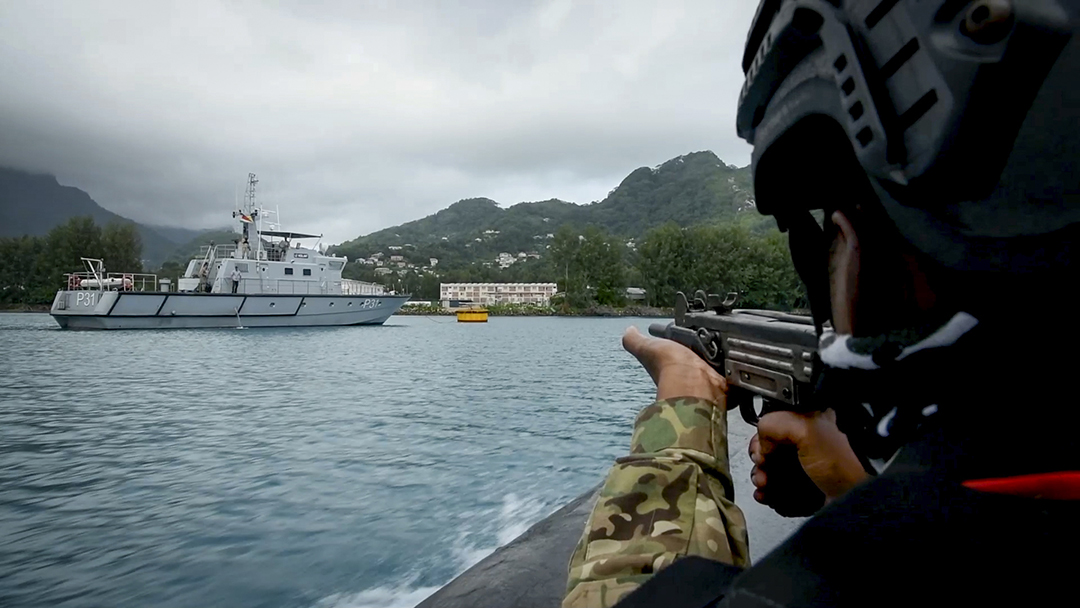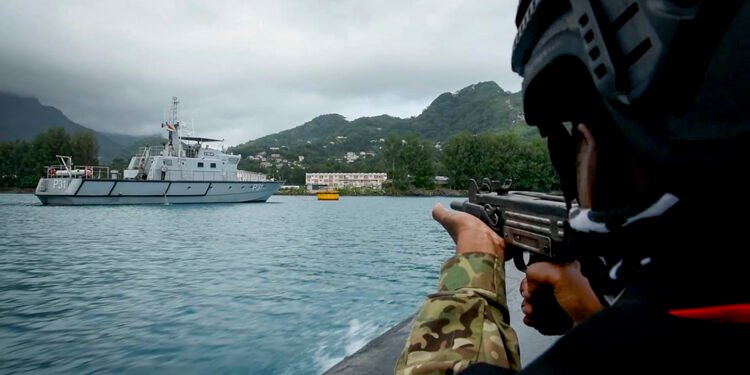
ADF STAFF
The Topaz, a Seychelles Coast Guard vessel, abruptly altered its direction in January when it was alerted to a Somali pirate attack on a Sri Lankan fishing trawler just outside the Seychelles exclusive economic zone.
The Seychellois ship encountered the pirates near Denis Island, in northeastern Seychelles, where the pirates opened fire. The Coast Guard crew aboard the Topaz had never been shot at, but members of Seychelles Special Forces also were on board.
The pirates surrendered after several minutes and were arrested by the Indian Navy, which also pursued them.
“We approached the boat with caution and discovered three Somali pirates on board,” Maj. Hans Radegonde, spokesperson for the Seychelles Defense Forces, told gCaptain, a maritime news platform. “Despite their resistance and gunfire directed at us, it took us six minutes to gain control of the situation. There has been a resurgence in piracy since last year. The pirates are operating nearer to Seychelles waters.”
Francis Milroy Perera, owner of the Sri Lankan vessel, expressed gratitude for the actions of the Seychelles and Indian forces alerted to the attack by the European Union’s Maritime Security Centre – Horn of Africa (MSCHOA). Somali pirates are known to seize fishing vessels and use them as “motherships” from which they launch more attacks.
“Our sailors and the vessel were saved after a great battle,” Perera told gCaptain.
Somali pirates staged a comeback in December 2023 after six years of dormancy. Officials recorded a total of 33 incidents of piracy and armed robbery against ships by Somali pirates in the first three months of 2024, an increase from 27 incidents for the same period in 2023, the International Maritime Bureau reported.
Maritime security experts writing for War on the Rocks said that the Seychelles Coast Guard’s role in the pirates’ arrest illustrates how even tiny regional states can have a profound effect in countering piracy and other sea crimes.
“It proves that a small state with limited capacity can make a difference if it is well trained, acts in a professional manner, and is willing to shoulder the responsibility of such missions,” they wrote. “It also shows the importance of information sharing and how well coordination in the western Indian Ocean can work if there is the will to act together.”
The authors added that ongoing support from the MSCHOA and the Combined Maritime Forces — a maritime security partnership led by the United States that assists in coordinating naval operations in the region — is critical to effectively counter Somali piracy.
They also urged small states to better appreciate the importance of the seas, recognize the sustainable development benefits of their blue economies, and summon the political will to better understand maritime security while making efficient use of external security support.
Another important tool in the fight against piracy is the Regional Coordination Operations Center (RCOC) in the Seychelles, which organizes regular maritime security operations.
The RCOC in December expanded its area of responsibility and now coordinates operations to counter sea crimes for 21 countries.
“That is a very strong mechanism that did not exist previously, so we should be able to see more effective deterrence,” maritime expert Ian Ralby, chief executive officer of I.R. Consilium, told ADF, “and hopefully any kind of operational activity on the water is paired with legal finish in a court in order to make sure that the pirates are truly held accountable and not just caught and released.”
The RCOC and the Regional Maritime Information Fusion Centre in Madagascar also share information with one another and any country facing a maritime threat. Their information often helps local, regional and international allies collaborate on at-sea arrests. If the threatened country is not able to interdict, it can request help from the RCOC.
The post Seychelles Demonstrates How Smaller Nations Can Effectively Combat Piracy appeared first on Africa Defense Forum.









